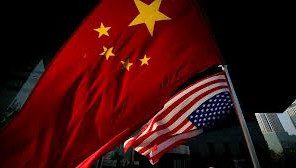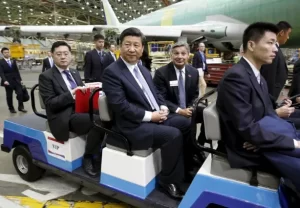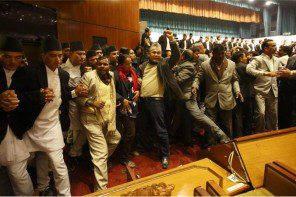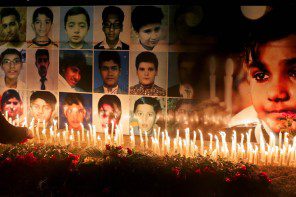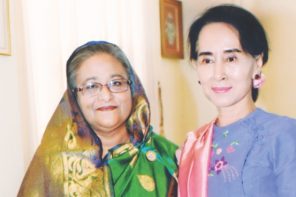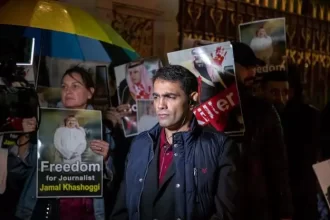Ishtiaque Alam
When, in 2009, President Barack Obama took office he inherited wide array of overwhelming foreign policy challenges. An out of control war in Afghanistan, a shaky counterterrorism partnership with Pakistan, instability in Iraq, a potent threat from al-Qaeda, a fragile Israel-Palestine peace process, an arrogant nuclear Iran, a wrecked relationship with Russia, a aggressive North Korea, a rising India and an assertive China. Added to it was a stern financial predicament at home and abroad. Of the most significant ideals the United States uphold globally one is promoting democracy, enabling peoples’ representatives to come in power. Unfortunately, the state of U.S. democracy promotion is also at peril. Intervening in Iraq and Afghanistan was closely associated with promotion of democracy while these moves, on the contrary, tarnished American image as a promoter of peoples’ power. Ramifications of this tarnished image were far reaching: an international backlash against democracy promotion that included extremely high levels of suspicion about the democracy agenda in the Arab world, a greatly heightened reluctance on the part of European and other international democracy supporters to be associated with U.S. policies and programs in this area, and a marked decline in U.S. public support for democracy promotion as a priority of U.S. foreign policy.
It is in this context that President Obama, freshly re-elected for his second tenure, underscores his desire to reorient American foreign policy more toward the Asia Pacific region; an extremely important step to firm up his Asia-Pacific policy, often described as a “pivot” to the region. President Obama announced in November 2011 his plan to ‘rebalance’ the U.S. position in the Asia-Pacific region. The core of this announcement was, as he said: “as President, I have therefore made a deliberate and strategic decision – as a Pacific nation, the United States will play a larger and long-term role in shaping this region and its future, by upholding core principles and in close partnership with allies and friends.” According to the White House announcement the newly re-elected President would head to an annual international economic summit meeting in Cambodia and stop in Thailand and Myanmar, formerly known as Burma. No sitting American President has visited either Myanmar, formerly known as Burma, or Cambodia, allowing Mr. Obama to reinforce his commitment to the region. Some observers put it as the beginning of the U.S re-engagement in the Asia-Pacific.
Now enthusiasts can rightly point out what significance does this visit carry? What benefits it may yield for the neighbors, especially for Bangladesh? This article will try to assess very briefly about the two queries.
Why Myanmar visit?
Shortly after his re-election President Obama announced the desire to head an annual international economic summit meeting in Cambodia with stop in Thailand and Myanmar. President Obama visited Myanmar in November 19, 2012. His stop at Myanmar is a historic one since no U.S. President has ever visited Myanmar. Prior to his Myanmar visit, Secretary of State Hillary Rodham Clinton’s visit to Myanmar in last November 2011 represents a dramatic shift in policy towards Myanmar, an opening that demonstrates a new U.S. focus on Asia by building ties to a strategically important country bordering China.
Analysts have termed this visit as a perfect fit into the larger geopolitical chess game by the Obama administration, which has sought to counter rising Chinese assertiveness by engaging its neighbors. China was Myanmar’s main international patron during the final years of military rule there, and the long-isolated country’s opening to the West comes amid a popular backlash against Beijing’s perceived influence and its role in extracting natural resources. The U.S. also wants to strengthen its ties with Myanmar for the reason that the relationship gap between the U.S. and Myanmar is too wide because of the various sanctions imposed by the U.S. and other Western countries on Myanmar and China, astutely, has taken the benefit of this prolonged absence of Western states to consolidate its footing virtually in all sectors of Myanmar polity.
Nonetheless, one should not forget the unique strategic geographical setting that Myanmar enjoys. Distinctively positioned between India and China, Myanmar’s large coastline grants naval access to the Strait of Malacca, one of the world’s most strategic water passages, the shortest sea route between the Persian Gulf and China. It is the key chokepoint in Asia. Myanmar is also strategically important for China’s ‘string of pearls’ theory which is designed to counter U.S. control over the Strait of Malacca. The geopolitical map of Southeast Asia reveals that Myanmar is the strategic backdoor of China, kind of a soft spot underbelly. Perhaps this justifies China’s incessant involvement with Myanmar.
Keeping aside geopolitical considerations Myanmar is important for the U.S. on certain other grounds as well. Myanmar’s internal deteriorated human rights scenario has always been in the forefront of the U.S. concerns. America’s sole desire is to shift power from military regime to the victors of the 1990 election. There is also the potential for state collapse in Myanmar, which in turn will only add fuel to the fire in further deteriorating instability to its neighbors. In the Fund for Peace made Failed State Index Myanmar currently stands at number 21 as the only country from Southeast Asia. Apart from state collapse, Myanmar’s narcotic production and export has become an irritant for the U.S. as the U.S. is a major destination of these illegal drugs.
With Obama’s visit the Myanmar government has pledged to release estimated 1600 political prisoners and up to November 2012 a total of 452 detainees were freed. Observers also said that President Obama’s visit will encourage Myanmar not to engage in any sort of military and nuclear trade with North Korea. Glyn Davies, U.S. Special Representative for North Korea Policy, remarked “I think that Burma’s on the right path, that they have made a strategic decision to fundamentally alter their relationship with the DPRK and to ultimately end these relationships with North Korea.” After Secretary of State Hilary Clinton’s visit to Myanmar, Washington appears to have accepted ‘strong assurance’ from Presient Thein Sein that Myanmar will work with the International Atomic Energy Agency (IAEA) on abiding its Additional Protocol. Once signed this instrument should help settle the U.S. and international fears about the possibility of a Burmese nuclear program.
Obama ended the longstanding U.S. isolation of Myanmar, which has played a part in coaxing them into political reforms that have unfolded with surprising speed in the past year. The U.S. has appointed a full ambassador and suspended sanctions to reward Myanmar for political prisoner releases and Suu Kyi’s election to parliament. As commented by U.S. Secretary of State Hillary Clinton in November 14, 2012 that President Barack Obama will discuss the deadly sectarian violence in Myanmar’s Rakhine state between Rohingya Muslims and Buddhists during his historic visit to the country, and Secretary Clinton said this unrest would “of course” be feature in Obama’s talks. In effect, President Obama in his Yangon University speech, iterated that “…..for too long, the people of this state, including ethnic Rakhine, have faced crushing poverty and persecution. But there is no excuse for violence against innocent people. And the Rohingya hold themselves — hold within themselves the same dignity as you do, and I do.”
Concerns for Bangladesh
With transfer of power from an authoritarian government to a civilian one in last March 2011, Myanmar has embarked on a slow political liberalization. President Thein Sein, a former military general, kicked off long expected reforms: over 700 political prisoners were released in October 2011 and January 2012. The country’s strict media regulations have been relaxed. The government has also relaxed internal censorship laws and unblocked the websites of exile radio and TV stations (Democratic Voice of Burma, Voice of America). With this reforms Myanmar has elevated its position in the international arena. As Myanmar emerges from decades of isolation it generates much hope for the global and regional communities.
With regard to Bangladesh Myanmar is her one of the only two neighbors. Bangladesh is overburdened with Rohingya asylum seekers who fled from Myanmar for the fear of persecution. Despite Bangladesh’s long efforts of sending these refugees back to Myanmar, Yangon did not pay much heed to take these people back. But we have to keep in mind that many matters are ostensibly difficult under military government than civilian ones. As positive changes begin to take place in Mynamar Bangladesh should take full benefit of this change. Bangladesh and Myanmar has two major long standing issues unsolved and one of them, the maritime boundary demarcation, has been resolved peacefully in last March 2012 by the International Tribunal for the Law of the Sea (ITLOS). Thus, the remaining issue is the repatriation of the Rohingya refugees. President Obama’s November 19, 2012 visit focuses some light on reconciliation of this issue. President Obama’s iteration and emphasis on resolving the Rohingya issue has put pressure on the Myanmar government to take reconciliatory measures to settle this issue. Hence, it is high time for Bangladesh to vigorously pursue all its diplomatic strings to move forward in clearing up the matter. But, very recently Aung Sun Suu Kyi, Myanmar’s iconic pro-democracy leader, commented that the recent violence in west Myanmar between Buddhists and Muslims is a “huge international tragedy”, and said “illegal immigration from Bangladesh had to be stopped “otherwise there will never be an end to the problem.” Bangladesh Foreign Ministry expressed sheer “surprise at such comments since these are clearly at variance from the position of the Myanmar Government and the action taken by them to resolve the issue over the last several years.” Such comment from a much respected personality worldwide reaffirms that Bangladesh needs to work not just with the government of Myanmar but also with Aung Sun Suu Kyi to bring the refugee issue to an acceptable solution.
President Obama’s visit will also likely to usher gradually lift of all sanctions and this will also enable international financial institutions like World Bank to engage in development works in Myanmar. As of November 2, 2012 the World Bank allocated US$245 million in credit and grant funding for Myanmar. The Bank also approved an $80 million grant for community-driven rural projects. This means that Myanmar is opening for foreign business and big U.S. companies – including GE and CocaCola – have returned to start business in Myanmar. Bangladesh can and should take this opportunity to expand its business to Myanmar. Bangladesh-Myanmar border trade volume was around US$ 23 million in 2011-2012. Bangladesh Commerce Ministry data shows that in 2010-2011 Bangladesh imported goods worth $179.00 million and exported goods worth $9.65 million and in 2009-2010 Bangladesh imported goods worth $69.61 million and exported goods worth $10.04 million. The trade gap was in Myanmar’s favor until the last FY and the gap is expected to be narrowed down as Myanmar has started to import some new materials from Bangladesh from early 2012. Myanmar has added cement, medicine, biscuit, iron, tin and soft drinks to the import list. Bangladesh also exports steel products, light engineering machinery, cement, dry foods, and cosmetics to Myanmar. Bangladesh can import energy from Myanmar and export readymade garments, pharmaceutical products, knitwears, jute and jute goods, ceramics to Myanmar at competitive price. Bangladesh’s decision to organize a “Single Country Trade Fair” in Yangon is a welcome decision in this regard. Thus, there is immense opportunity for Bangladesh to reap commercial benefits from a newly open Myanmar.
President Obama’s visit to Myanmar represents a high degree of ‘symbolism’. With his visit EU is also planning to reconsider the possibility of the removal of sanctions earlier imposed. Thus, it will not be surprising if other western and European nations show their interest in investing in Myanmar. Bangladesh should take calculated and prudent decisions to expand its business coverage in Myanmar keeping in mind its larger Look East policy.
Concluding thoughts
Bangladesh should portray that Myanmar has much to win from her western neighbor. Bangladesh’s extended maritime frontier along with the future plan of constructing deep-sea port at Sonadia will make this region a regional hub and benefits will be available to all other Asian countries let alone Myanmar. Of course connectivity through land, sea and air must get priority but that does not, by any means, imply that people to people contact between the two countries should be lesser. On the contrary track two level interactions should get boost though various cultural exchanges, sports, educations, trade fairs, and other mutually beneficial activities. Fine tuning of bilateral relations between Bangladesh and Myanmar will only bring common good to the entire region. The reforms those are currently undergoing in Myanmar are praiseworthy and upon their success depend much of the prospect of stability and development in the region. Hence, Bangladesh should rally its full support in favor of Myanmar’s much expected reforms courting the international community and device calculated plan to bolster bilateral relations. The biggest fact is a more open and stable Myanmar presents the greatest opportunities for strengthening bilateral relation in an amicable manner.

